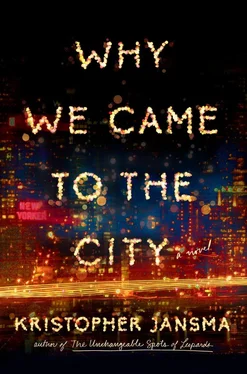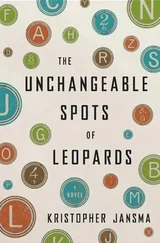NOVEMBER
Either Oliver felt guilty enough or Jacob’s cold shoulder wore him down, because at the beginning of November the paperwork was completed to have Jacob join the staff part time as an assistant art therapist. This meant he’d work an extra shift per week, which barely helped cover his train ride each day up and back from Harlem, but he didn’t mind. Under the auspices of this “special pilot program,” he was even able to get permission to walk with patients around the property. He had a budget to buy books (one copy of The Odyssey , which had to be shared) and an hour a week to meet with patients to discuss readings on an individual basis. Maura signed up, and then so did Roy (they were “dating” now, whatever that meant when you were both stuck in a mental institution), and then Jane and Annabeth joined.
It was slow going. A lot of them protested the choice of material. Many seemed to be hoping they’d talk about The Hunger Games, but Jacob encouraged them to read slowly and out loud if a passage didn’t make sense at first. They discussed history and geography as they hiked around in the crisp, late autumn fog. Around the overgrown foundations of the original manor house, they dissected the Lotus Eaters, and down in the graveyard they went over the cannibalistic Laestrygonians. Under the drip of mossy overgrown trees, Jacob began to recall some of the Gothic creepiness that had appealed to him about this place not so long ago. They walked to the farthest north side of the property, past the stables with the collapsed roof, where they could stand amid the rubble and read from “Nausicaa” while the clean-suited men and women of Discover Card waited for the bus across the highway. Down by the duck pond they watched the Chinese Academy boys soccer team practicing their goal kicks. Jacob and Maura spoke about the Cyclops.
“Odysseus is kind of obnoxious,” Maura observed. “He manages to get away from Polyphemus and instead of being, I don’t know, grateful , he’s got to stand on his ship and call him a ‘shameless cannibal’ and a ‘coward.’ No wonder the poor thing decides to hurl half a mountain at him. And then Poseidon makes him get lost for another ten years or whatever?”
“Hubris,” Jacob said. “Arrogance. Pride. Everybody’s got a bit of it in them somewhere.”
Maura looked as if she might prefer to just jump into the duck pond. Jacob had never paid much attention to her before, but she was a sweet kid, shyer than Ella and twice as anxious.
“Well, think about it this way,” he said. “If Odysseus hadn’t been so high on his own superior intelligence, he’d have gotten home to Ithaca in weeks, not years. He wouldn’t have lived with the sorceress Circe or seen the land of the dead or bested Scylla and Charybdis. That’s half the story, and the better half too. Literature is really just the documentation of human struggling.”
This seemed to perk her spirits up more than a little. Jacob was happy to be outside, talking about poetry. The ducks hadn’t yet flown south, and the boys across the way were running comically in place, cotton socks pulled up to their knees. Thanksgiving was coming up. He couldn’t believe it had been a year already.
“I wish we still had gods,” Maura said eventually.
“I’ve never been very religious myself,” Jacob admitted.
“No, I mean gods , plural. What I love about this book is that there’s all these monsters just sort of going about their evil business. And there are twelve gods running around up there on Mount Olympus, fighting, getting in each other’s way, hopping down to mess with the mortals whenever the mood strikes them. It all just makes a lot more sense to me. None of them are all-powerful or all-knowing, not even Zeus. They’re constantly getting stuff wrong. It explains all the evil stuff that gets missed, like these monsters on their islands. Makes more sense than there being just this one God up there, supposedly completely understanding everything and intending everything — even, like, plagues and assault rifles and starvation and AIDS and homeless veterans and just plain old sadness.”
Jacob tried to step in, but Maura wasn’t nearly finished.
“And, like, everyone seems to think that this must be proof that there is no God. Or that if there ever was a guy up there smiting sinners and sending angels off to grace the faithful, He’s packed his bags and headed off for greener pastures. But what if the Greeks had it right, and there are just too many of them. Bumping around up there, trying to get things right and not always doing such a great job — forgetting monsters, getting too drunk, and running off with the wives of other gods, but still coming through with a nice miracle now and then? I think we need more gods. That’s what I think. One isn’t enough.”
Jacob clapped. It was a rant he’d be proud to call his own.
Maura grinned. “Oh, by the way, I got a letter from Ella last week! She’s making the dean’s list at school and dating some new guy named Fred. Seems nice, if you like guys named Fred. Everything’s going really well. She asked about you.”
Jacob looked off at the lake. He wondered how a diaper had managed to get in there, and he watched as the bloated, grimy thing floated back and forth in the breeze. “You know, before The Odyssey , before the Trojan War even started, Odysseus didn’t want to go?”
Maura shook her head.
“He didn’t want to be a hero or get into a huge war over Helen of Troy, even though he’d sworn an oath to Menelaus that he would. The poor guy just wanted to stay home. So he pretended he’d gone insane, thinking it would get him excused from military service. He ran around plowing his fields, day and night, with salt instead of grain and, I imagine, ranting and raving like a lunatic for any and all to see. And everybody bought it — he almost got away with it. But then Agamemnon came by and decided to test Odysseus to see if he was truly crazy. He put Odysseus’s infant son down in the field in front of the plow. He reasoned that if Odysseus were really insane, or really wanted to stay safe at home, he’d plow right over his son. But of course, he didn’t.”
“What a jerk,” she said. “The other guy, I mean.”
“Oh, well. He gets hacked to death later on,” Jacob grinned.
This didn’t seem to comfort her as much as it did him.
“My point is that Odysseus knew he had to choose,” he said. “He knew that even though the gods favored him, they weren’t going to get him out of the jam. He knew he was going to have to stop pretending and get out there and fight , not just because he loved his son but because he had made an oath and was bound to keep it. And so he went off to the longest, bloodiest, most absurd war that had been fought in the history of mankind. And he was the one who cleverly dreamed up the Trojan horse and finally ended it.
“If he had never gone — if he had stayed home with his son as any sane man would want to do — well, who knows? For sure, Homer wouldn’t have written one book about him, let alone two, and half of Western literature wouldn’t have been based on the trials and tribulations of this crafty, arrogant guy and all the good and all the evil he saw. This guy who won a war and spoke to gods. This guy who dined at distant palaces and sailed to corners of the globe that no one had yet set foot on. This guy who crossed over into the land of the dead and returned to tell about it. There wasn’t a man alive then who’d seen so much of the world as Odysseus, good and bad, and that is the point.
“You’ve got to entrust yourself to the waves, lash yourself to the mast, pray the gods are on your side, and rely on cunning to survive the rest. The seas are full of forgotten monsters, yes, but they’re full of forgotten glories too. And the people who stay home and sit out the war never get to see them. That’s what I think, anyway.”
Читать дальше












